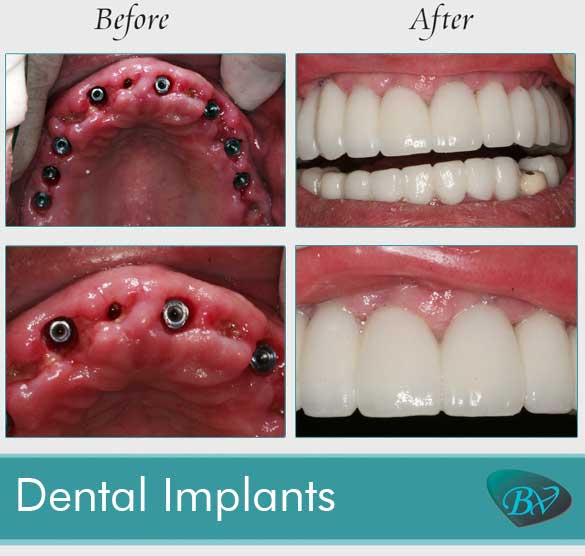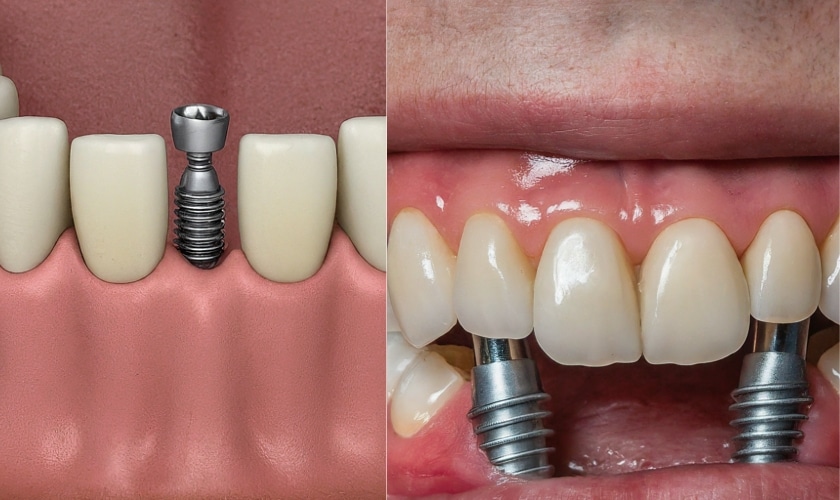Things about Dental Sense
Things about Dental Sense
Blog Article
Little Known Questions About Dental Sense.
Table of ContentsThe 5-Second Trick For Dental SenseDental Sense for DummiesIndicators on Dental Sense You Need To KnowDental Sense Fundamentals Explained
are clinical devices operatively implanted right into the jaw to restore an individual's capacity to chew or their appearance. They supply assistance for man-made (phony) teeth, such as crowns, bridges, or dentures. When a tooth is shed because of injury or illness, an individual can experience difficulties such as quick bone loss, malfunctioning speech, or adjustments to eating patterns that result in discomfort.Dental dental implant systems include an oral implant body and dental implant abutment and may likewise include a joint fixation screw. Wisdom tooth cavity. The oral implant body is operatively put in the jawbone in area of the tooth's root. The dental implant abutment is typically affixed to the dental implant body by the abutment addiction screw and prolongs with gums right into the mouth to sustain the connected synthetic teeth
(https://giphy.com/channel/dentalsense1)Structure of The Oral Implant System selecting dental implants, talk with your dental company about the potential benefits and dangers, and whether you are a prospect for the procedure. Points to take into consideration: Your overall wellness is an essential consider establishing whether you are a great candidate for dental implants, just how long it will take to recover, and for how long the implant might stay in place.
Smoking may impact the recovery process and reduce the long-lasting success of the implant. The healing process for the implant body might take several months or longer, throughout which time you commonly have a momentary joint instead of the tooth. the dental implant procedure: Meticulously comply with the dental hygiene guidelines offered to you by your dental service provider.
How Dental Sense can Save You Time, Stress, and Money.
Implant failing can cause the requirement for another procedure to repair or change the implant system. Recovers the capacity to eat Brings back cosmetic appearance Assists maintain the jawbone from shrinking because of bone loss Protects the health of the surrounding bone and gum tissues Helps maintain adjacent (nearby) teeth steady Improves lifestyle Damages to surrounding natural teeth throughout dental implant placement Injury to the surrounding cells throughout surgical procedure, such as sinus perforation Injury during surgery (for instance, crack of surrounding jawbone) Poor function, such as feeling like the teeth do not bite together normally An experience that the tooth is loose or twisting in position resulting from an abutment screw loosening up Implant body failure (looseness of the implant body) as a result of systemic infection, which may be most likely in people with unchecked diabetics issues due to local infection in bone and gums supporting the implant body due to postponed recovery, which may be most likely in patients that smoke Difficulty cleansing the gums around the implant, resulting in poor oral health Without treatment gum disease Post-surgical numbness as a result of nerve impingement or damage Constantly alert health treatment carriers and imaging professionals that you have oral implants prior to any kind of magnetic resonance imaging (MRI) or x-ray procedures.
FDA is not knowledgeable about any damaging occasions reported for MRI or x-ray procedures with oral implants. Dental implants systems are generally constructed from products that adhere to international agreement criteria of the International Organization for Standardization (ISO) or ASTM International. These criteria have details of what makes a secure product.

An oral implant is a structure that replaces a missing out on tooth. With screw-like gadgets, the doctor inserts a dental implant into the jawbone, and it functions as an anchor for a synthetic tooth, called a crown. A device called an abutment attaches the man-made tooth to the oral implant. The crown is custom-made to fit the person's mouth and match the shade of their teeth.
Fascination About Dental Sense
Some individuals are not qualified for oral implant surgical procedure. It is for dental surgeons to operate individuals with: severe illnessuncontrollable metabolic diseasebone or soft cells disease or infectionIf these issues are settled, an individual can have the surgical treatment. In, oral cosmetic surgeons abstain from running on people with: If people with any of the above undertake oral implant surgical treatment, there is a greater threat of the implant failing.

Oral dental implant surgical treatment is a personalized procedure. Give you time to recover. Attach the post and final crown, bridge or denture.
Next, your specialist will carefully put the dental implant right into your jaw. Your surgeon will rearrange your periodontals and close the cut with stitches. more If your dental implant is near the front of your mouth, your dentist will certainly make a momentary tooth for you to put on till you recover. In this way, you will not have a gap in your smile while you recuperate.
Our Dental Sense Statements
Throughout the recovery stage, your jawbone ought to fuse to the dental implant. This process can take anywhere from 3 to nine months.
When your dental implant heals, your dental professional can connect the abutment (tiny connector article) and your final repair (crown, bridge or denture). This typically takes about one hour to complete and might require a 2nd minor surgical procedure. You shouldn't really feel any type of discomfort during your dental implant treatment since your service provider will make use of medication to numb your gum tissues.
Report this page